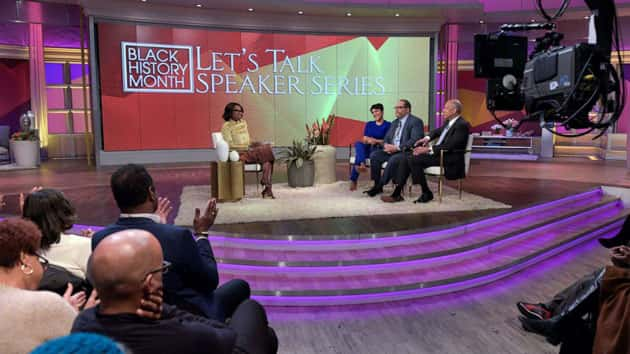
Paula Lobo/ABC(NEW YORK) — Former U.S. Homeland Security Sec. Jeh Johnson, Harvard fellow Tiffany Cross and author and Georgetown University sociology professor Michael Eric Dyson explained why voter suppression affects black communities more often and the ways in which misinformation can make it worse during a panel discussion on Thursday.
The panel spoke about voter suppression with ABC News correspondent Deborah Roberts as part of ABC News’ Black History Month Speaker Series.
During their discussion, Dyson acknowledged that it can be difficult for the everyday person to differentiate fake and real political news, and noted how disinformation can influence people not to vote or make decisions under false pretenses. With so much misinformation out there, he said that “people who work everyday” don’t have “the ability to adjudicate competing claims of what’s true and not true because they’re trying to work.”
“What we can do is energize the millennials and those [who are] younger,” Dyson said. “Instead of talking about who did what and who wore what, imagine if we had Instagram influences out here talking about [voter suppression]. That would make a huge difference in the consciousness of those who are on the rise.”
Johnson, meanwhile, spoke about the national threat that voter suppression poses, particularly when it comes to cybersecurity.
“When you’re dealing with elections at the national level, the result really does dance on the head of a pin,” Johnson said. “The presidential election is decided in just a few states; in a few key swing districts in those states. If you’re a foreign actor — a foreign influence — it would be relatively easy to target key places in those states that could have the effect of altering the outcome of the election.”
When asked if the Department of Homeland Security and the U.S. government is making progress in protecting elections from foreign interference, Johnson said, “We don’t have a handle on it” and that “government security agencies should not be in the business of regulating political debate.”
“It is incumbent upon internet service providers [and] social media providers to do a better job of policing their own terms of use in terms of its content, in terms of its attribution,” Johnson said. “The American public should become more skeptical about what they consume.”
“As long as we’re talking about international election interference, we also have to keep in mind domestic election interference, and together, these two can really destroy our democracy,” Cross said.
Cross also spoke about the ways in which social media can help people feel heard.
“If the only time I saw outrage about the murder of Sandra Bland or Tamir Rice or Trayvon Martin was with media or a meme on Facebook or a GIF on Instagram, then yes, that is a voice that is giving me a voice,” Cross said. “I felt left out because I did not see that in the mainstream media.”
Although it’s traditionally black communities that are targeted victims of voter suppression, Cross said they aren’t the only ones that fall victim to voter suppression.
“This is something that affects the Latinx community [and] the Native American community” as well, she said.
Copyright © 2020, ABC Audio. All rights reserved.
